2023届高三英语二轮复习八种常用时态课件-(26张ppt)
文档属性
| 名称 | 2023届高三英语二轮复习八种常用时态课件-(26张ppt) | 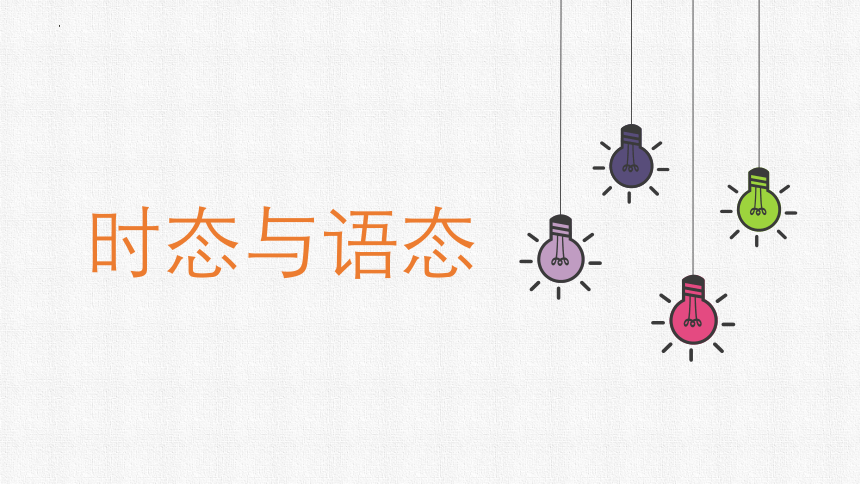 | |
| 格式 | pptx | ||
| 文件大小 | 2.6MB | ||
| 资源类型 | 教案 | ||
| 版本资源 | 通用版 | ||
| 科目 | 英语 | ||
| 更新时间 | 2022-11-19 18:12:28 | ||
图片预览

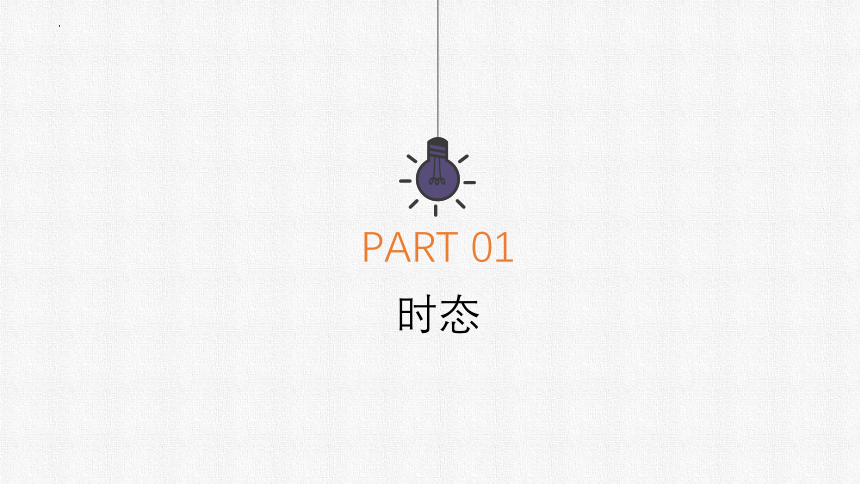
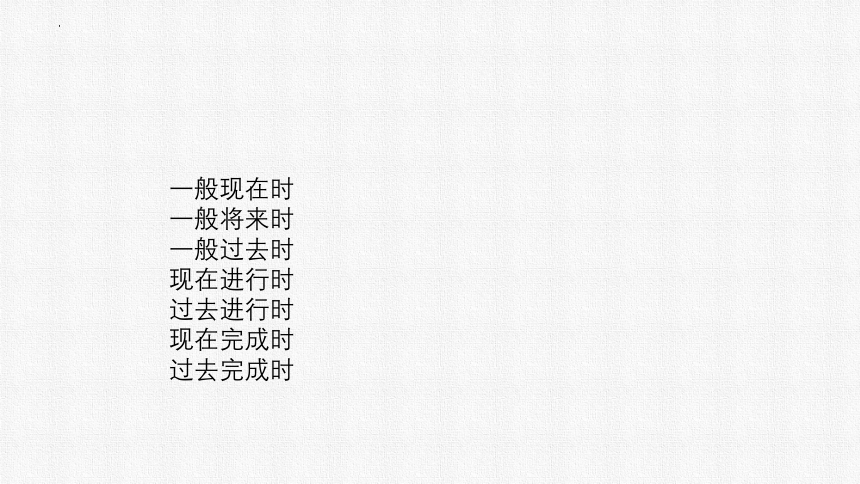
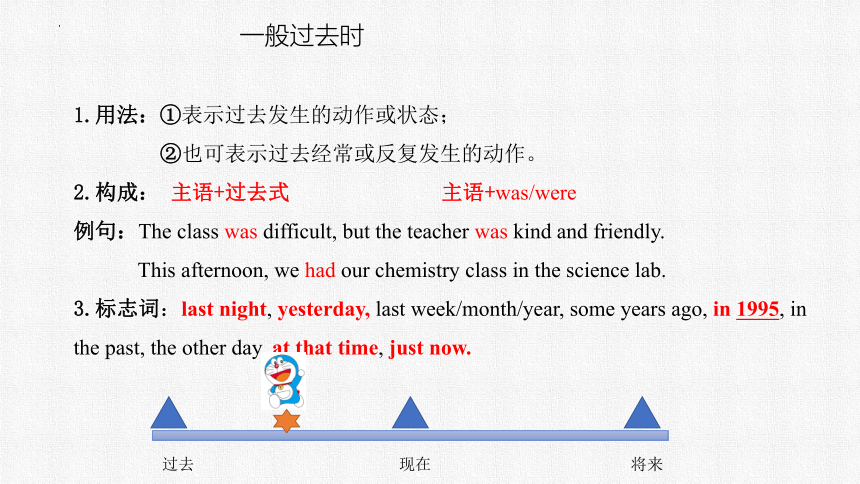

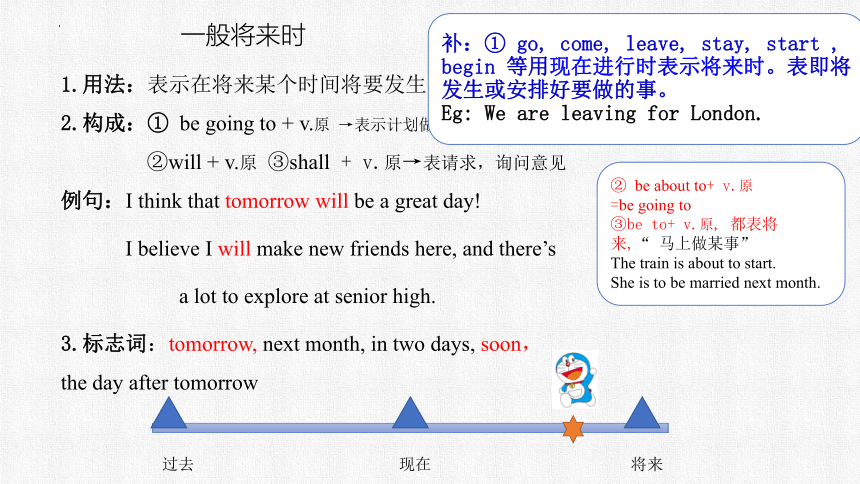
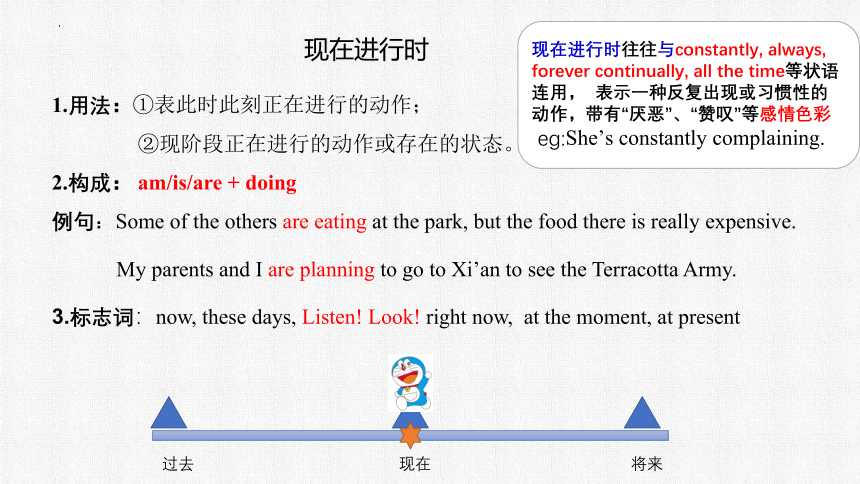
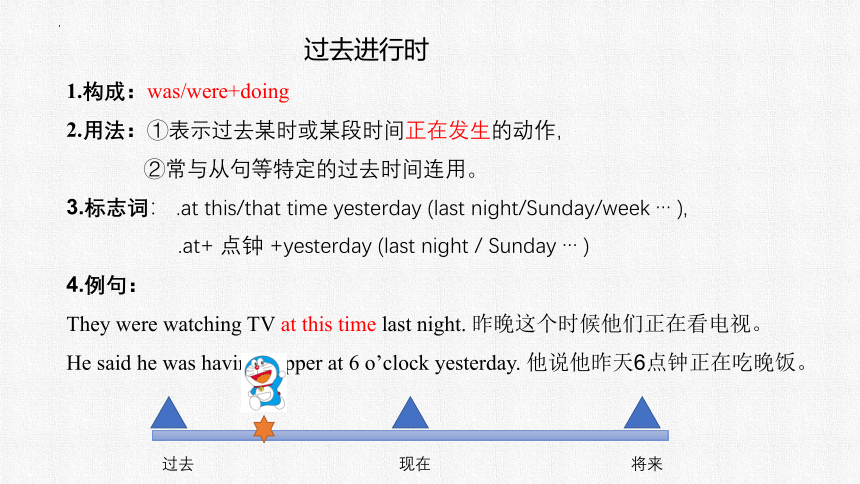
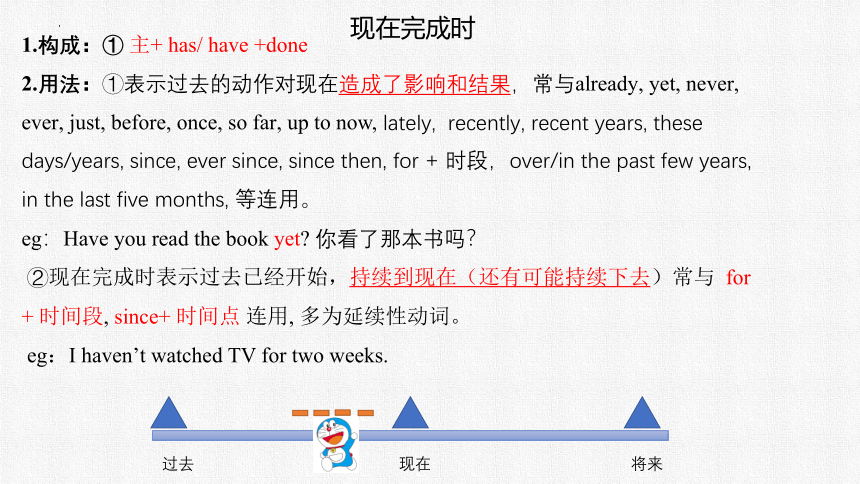
文档简介
(共26张PPT)
时态与语态
时态
PART 01
一般现在时
一般将来时
一般过去时
现在进行时
过去进行时
现在完成时
过去完成时
1.用法:①表示过去发生的动作或状态;
②也可表示过去经常或反复发生的动作。
2.构成: 主语+过去式 主语+was/were
例句:The class was difficult, but the teacher was kind and friendly.
This afternoon, we had our chemistry class in the science lab.
3.标志词:last night, yesterday, last week/month/year, some years ago, in 1995, in the past, the other day, at that time, just now.
过去
现在
将来
一般过去时
1.用法:①表经常性或习惯性的动作或存在的状态
②客观事实或普遍真理。
③时刻表安排规定计划要发生的事情。
2.构成: do/does
例句:A thousand-mile journey begins with the first step.
The earth goes around the sun.
3.标志词:always, often, usually, sometimes, once a day/week/month/year, every day, never, hardly ever(几乎不), on Mondays等.
过去
现在
将来
在含时间和条件状语从句的复合句中如由when, if, as soon as,before, until,once, the moment等,用一般现在表将来,即主将从现。
eg:I will go with you as soon as I finish my work.
一般现在时
1.用法:表示在将来某个时间将要发生的动作或存在的状态
2.构成:① be going to + v.原 →表示计划做某事/有迹象要发生某事
②will + v.原 ③shall + v.原→表请求,询问意见
例句:I think that tomorrow will be a great day!
I believe I will make new friends here, and there’s
a lot to explore at senior high.
3.标志词:tomorrow, next month, in two days, soon,
the day after tomorrow
过去
现在
将来
补:① go, come, leave, stay, start , begin 等用现在进行时表示将来时。表即将发生或安排好要做的事。
Eg: We are leaving for London.
② be about to+ v.原
=be going to
③be to+ v.原, 都表将来,“ 马上做某事”
The train is about to start.
She is to be married next month.
一般将来时
现在进行时
1.用法:①表此时此刻正在进行的动作;
②现阶段正在进行的动作或存在的状态。
2.构成: am/is/are + doing
例句: Some of the others are eating at the park, but the food there is really expensive.
My parents and I are planning to go to Xi’an to see the Terracotta Army.
3.标志词:now, these days, Listen! Look! right now, at the moment, at present
过去
现在
将来
现在进行时往往与constantly, always, forever continually, all the time等状语连用, 表示一种反复出现或习惯性的动作,带有“厌恶”、“赞叹”等感彩
eg:She’s constantly complaining.
过去进行时
1.构成:was/were+doing
2.用法:①表示过去某时或某段时间正在发生的动作,
②常与从句等特定的过去时间连用。
3.标志词: .at this/that time yesterday (last night/Sunday/week … ),
.at+ 点钟 +yesterday (last night / Sunday … )
4.例句:
They were watching TV at this time last night. 昨晚这个时候他们正在看电视。 He said he was having supper at 6 o’clock yesterday. 他说他昨天6点钟正在吃晚饭。
过去
现在
将来
现在完成时
1.构成:① 主+ has/ have +done
2.用法:①表示过去的动作对现在造成了影响和结果,常与already, yet, never, ever, just, before, once, so far, up to now, lately, recently, recent years, these days/years, since, ever since, since then, for + 时段,over/in the past few years, in the last five months, 等连用。
eg:Have you read the book yet 你看了那本书吗?
②现在完成时表示过去已经开始,持续到现在(还有可能持续下去)常与 for + 时间段, since+ 时间点 连用, 多为延续性动词。
eg:I haven’t watched TV for two weeks.
过去
现在
将来
现在完成时
3.句型
have/has gone to +sp. 已经去某地(还没回来)
Eg: My parents aren’t at home, they have gone to Nanjing.
(2) have/has been to +sp. 曾经去过某地(去过已经回来)
Eg: The beautiful girl has been to Beijing three times.
(3) have/has been in +sp. 在某地待了一段时间
Eg: She has been in China for ten years.
过去
现在
将来
过去完成时
1.结构:主语+had done
2.用法:①一件事情发生在过去,而另一件事先于它发生(即“过去的过去”)用过去完成。
I had learnt 5000 words before I entered the university.
②表示从过去某一时间开始,一直延续到过去的另一时间的动作,常用的时间状语有:until/ by/ before/ by the end of +“表过去的某一时间”。
By the end of last year, we had built five new houses.
过去
现在
将来
过去的过去
Practice
My mother (play)the piano every Sunday.
Our math teacher (grade) our schoolwork now.
By the end of last year, we (produce)20,000 cars.
My brother (go) to London last summer.
We were all surprised when he made it clear that he (leave) office soon.
In the past ten years, China (witness) great changes.
A new teacher_ (come) tomorrow.
We (have) a math class at this time yesterday.
plays
is grading
had produced
went
would leave
has witnessed
will come
were having
语态
PART 02
STEP 1
STEP 3
The definition of voices
Make sentences:
我们每天都打扫教室。
教室每天都被我们打扫。
We clean the classroom everyday.
The classroom is cleaned by us everyday.
What is the difference
STEP 1
STEP 3
主动语态:主语是动作的发出者。
被动语态:主语是动作的承受者。
The definition of voices
We clean the classroom everyday.
The classroom is cleaned by us everyday.
发出者
动作
承受者
承受者
发出者
动作
STEP 3
The structure of passive voice
一般现在时:am/is/are + done
一般过去时:was/were + done
一般将来时:will/be going to + be done
Be + 及物动词的过去分词
一般现在时:The classroom us everyday.
一般过去时:The classroom us yesterday.
一般将来时:The classroom us tomorrow.
is cleaned by
was cleaned by
will be cleaned by
STEP 3
The structure of passive voice
Be + 及物动词的过去分词
现在进行时:am/is/are being done
过去进行时:was/were being done
现在进行时:The classroom us now.
过去进行时:The classroom us at that time yesterday.
is being cleaned by
was being cleaned by
STEP 3
The structure of passive voice
Be + 及物动词的过去分词
现在完成时:have/has been done
过去完成时:had been done
情态动词: 情态动词+be done
现在完成时:The classroom us for two hours.
过去完成时:The classroom us for two hours yesterday.
情态动词:The classroom us.
has been cleaned by
had been cleaned by
must be cleaned by
STEP 3
主动语态变被动语态
STEP 1
We clean the classroom everyday.
The classroom is cleaned by us everyday.
发出者
动作
承受者
承受者
发出者
动作
STEP 3
主动语态变被动语态
主动语态的宾语变为被动语态的主语,宾格变主格。
谓语变为被动结构,be+过去分词
主动语态的主语变为被动语态的宾语,主格变宾格,并由by引导,有时可以省略。
He writes a letter every week.
A letter
is written by
him
every week.
宾语提前主语变,原主变宾by后见,时态人称be关键。
STEP 3
主动语态变被动语态
主谓双宾结构
间接宾语变为主语,保留直接宾语。
直接宾语变为主语,保留间接宾语,并且在间接宾语前+to/for
She sent me a card.
A card
was sent
by her.
to me
I
was sent
by her.
a card
STEP 3
注意事项
主动形式表示被动意义
(1) look, smell, taste, feel, sound, prove等系动词用主动表示被动意义。
例: The cake smells delicious.蛋糕闻起来很香。
(2) wash, open , read ,write ,cut, sell, drive等词作不及物动词且它们的主语为物,可用主动表示被动意义。
例: The cloth washes well.这种布料好洗。
The book sells quickly.这书销售得快。
STEP 3
注意事项
主动形式表示被动意义
(3) be worth + doing表示“值得... ”
例: This film is worth seeing.这部电影值得看。
(4) want/need/require+doing 表示“需要” =want/need/require + to be done
例: My watch needs repairing/to be repaired. 我的手表需要修理。
My clothes want washing/to be washed. 我的衣服需要洗了。
STEP 3
注意事项
不能用被动语态的情况
(1)不及物动词happen, take place, die, rise,come true等没有被动语态。
例:All your dreams will come true if you try your best.
(2)当谓语为某些表示状态的及物动词,cost, have, own, hold,last等时,不能用被动语态。
例: Our holiday lasts 10 days.
STEP 3
注意事项
用it做形式主语的被动句型
It is said that…… 据说
Sb. is said to do……
例: It is said that Edison invented the light.
Edison is said to have invented the light.
It is reported that…… 据报道
It is known that…… 众所周知
It is believed that…… 人们相信
谢谢观赏
时态与语态
时态
PART 01
一般现在时
一般将来时
一般过去时
现在进行时
过去进行时
现在完成时
过去完成时
1.用法:①表示过去发生的动作或状态;
②也可表示过去经常或反复发生的动作。
2.构成: 主语+过去式 主语+was/were
例句:The class was difficult, but the teacher was kind and friendly.
This afternoon, we had our chemistry class in the science lab.
3.标志词:last night, yesterday, last week/month/year, some years ago, in 1995, in the past, the other day, at that time, just now.
过去
现在
将来
一般过去时
1.用法:①表经常性或习惯性的动作或存在的状态
②客观事实或普遍真理。
③时刻表安排规定计划要发生的事情。
2.构成: do/does
例句:A thousand-mile journey begins with the first step.
The earth goes around the sun.
3.标志词:always, often, usually, sometimes, once a day/week/month/year, every day, never, hardly ever(几乎不), on Mondays等.
过去
现在
将来
在含时间和条件状语从句的复合句中如由when, if, as soon as,before, until,once, the moment等,用一般现在表将来,即主将从现。
eg:I will go with you as soon as I finish my work.
一般现在时
1.用法:表示在将来某个时间将要发生的动作或存在的状态
2.构成:① be going to + v.原 →表示计划做某事/有迹象要发生某事
②will + v.原 ③shall + v.原→表请求,询问意见
例句:I think that tomorrow will be a great day!
I believe I will make new friends here, and there’s
a lot to explore at senior high.
3.标志词:tomorrow, next month, in two days, soon,
the day after tomorrow
过去
现在
将来
补:① go, come, leave, stay, start , begin 等用现在进行时表示将来时。表即将发生或安排好要做的事。
Eg: We are leaving for London.
② be about to+ v.原
=be going to
③be to+ v.原, 都表将来,“ 马上做某事”
The train is about to start.
She is to be married next month.
一般将来时
现在进行时
1.用法:①表此时此刻正在进行的动作;
②现阶段正在进行的动作或存在的状态。
2.构成: am/is/are + doing
例句: Some of the others are eating at the park, but the food there is really expensive.
My parents and I are planning to go to Xi’an to see the Terracotta Army.
3.标志词:now, these days, Listen! Look! right now, at the moment, at present
过去
现在
将来
现在进行时往往与constantly, always, forever continually, all the time等状语连用, 表示一种反复出现或习惯性的动作,带有“厌恶”、“赞叹”等感彩
eg:She’s constantly complaining.
过去进行时
1.构成:was/were+doing
2.用法:①表示过去某时或某段时间正在发生的动作,
②常与从句等特定的过去时间连用。
3.标志词: .at this/that time yesterday (last night/Sunday/week … ),
.at+ 点钟 +yesterday (last night / Sunday … )
4.例句:
They were watching TV at this time last night. 昨晚这个时候他们正在看电视。 He said he was having supper at 6 o’clock yesterday. 他说他昨天6点钟正在吃晚饭。
过去
现在
将来
现在完成时
1.构成:① 主+ has/ have +done
2.用法:①表示过去的动作对现在造成了影响和结果,常与already, yet, never, ever, just, before, once, so far, up to now, lately, recently, recent years, these days/years, since, ever since, since then, for + 时段,over/in the past few years, in the last five months, 等连用。
eg:Have you read the book yet 你看了那本书吗?
②现在完成时表示过去已经开始,持续到现在(还有可能持续下去)常与 for + 时间段, since+ 时间点 连用, 多为延续性动词。
eg:I haven’t watched TV for two weeks.
过去
现在
将来
现在完成时
3.句型
have/has gone to +sp. 已经去某地(还没回来)
Eg: My parents aren’t at home, they have gone to Nanjing.
(2) have/has been to +sp. 曾经去过某地(去过已经回来)
Eg: The beautiful girl has been to Beijing three times.
(3) have/has been in +sp. 在某地待了一段时间
Eg: She has been in China for ten years.
过去
现在
将来
过去完成时
1.结构:主语+had done
2.用法:①一件事情发生在过去,而另一件事先于它发生(即“过去的过去”)用过去完成。
I had learnt 5000 words before I entered the university.
②表示从过去某一时间开始,一直延续到过去的另一时间的动作,常用的时间状语有:until/ by/ before/ by the end of +“表过去的某一时间”。
By the end of last year, we had built five new houses.
过去
现在
将来
过去的过去
Practice
My mother (play)the piano every Sunday.
Our math teacher (grade) our schoolwork now.
By the end of last year, we (produce)20,000 cars.
My brother (go) to London last summer.
We were all surprised when he made it clear that he (leave) office soon.
In the past ten years, China (witness) great changes.
A new teacher_ (come) tomorrow.
We (have) a math class at this time yesterday.
plays
is grading
had produced
went
would leave
has witnessed
will come
were having
语态
PART 02
STEP 1
STEP 3
The definition of voices
Make sentences:
我们每天都打扫教室。
教室每天都被我们打扫。
We clean the classroom everyday.
The classroom is cleaned by us everyday.
What is the difference
STEP 1
STEP 3
主动语态:主语是动作的发出者。
被动语态:主语是动作的承受者。
The definition of voices
We clean the classroom everyday.
The classroom is cleaned by us everyday.
发出者
动作
承受者
承受者
发出者
动作
STEP 3
The structure of passive voice
一般现在时:am/is/are + done
一般过去时:was/were + done
一般将来时:will/be going to + be done
Be + 及物动词的过去分词
一般现在时:The classroom us everyday.
一般过去时:The classroom us yesterday.
一般将来时:The classroom us tomorrow.
is cleaned by
was cleaned by
will be cleaned by
STEP 3
The structure of passive voice
Be + 及物动词的过去分词
现在进行时:am/is/are being done
过去进行时:was/were being done
现在进行时:The classroom us now.
过去进行时:The classroom us at that time yesterday.
is being cleaned by
was being cleaned by
STEP 3
The structure of passive voice
Be + 及物动词的过去分词
现在完成时:have/has been done
过去完成时:had been done
情态动词: 情态动词+be done
现在完成时:The classroom us for two hours.
过去完成时:The classroom us for two hours yesterday.
情态动词:The classroom us.
has been cleaned by
had been cleaned by
must be cleaned by
STEP 3
主动语态变被动语态
STEP 1
We clean the classroom everyday.
The classroom is cleaned by us everyday.
发出者
动作
承受者
承受者
发出者
动作
STEP 3
主动语态变被动语态
主动语态的宾语变为被动语态的主语,宾格变主格。
谓语变为被动结构,be+过去分词
主动语态的主语变为被动语态的宾语,主格变宾格,并由by引导,有时可以省略。
He writes a letter every week.
A letter
is written by
him
every week.
宾语提前主语变,原主变宾by后见,时态人称be关键。
STEP 3
主动语态变被动语态
主谓双宾结构
间接宾语变为主语,保留直接宾语。
直接宾语变为主语,保留间接宾语,并且在间接宾语前+to/for
She sent me a card.
A card
was sent
by her.
to me
I
was sent
by her.
a card
STEP 3
注意事项
主动形式表示被动意义
(1) look, smell, taste, feel, sound, prove等系动词用主动表示被动意义。
例: The cake smells delicious.蛋糕闻起来很香。
(2) wash, open , read ,write ,cut, sell, drive等词作不及物动词且它们的主语为物,可用主动表示被动意义。
例: The cloth washes well.这种布料好洗。
The book sells quickly.这书销售得快。
STEP 3
注意事项
主动形式表示被动意义
(3) be worth + doing表示“值得... ”
例: This film is worth seeing.这部电影值得看。
(4) want/need/require+doing 表示“需要” =want/need/require + to be done
例: My watch needs repairing/to be repaired. 我的手表需要修理。
My clothes want washing/to be washed. 我的衣服需要洗了。
STEP 3
注意事项
不能用被动语态的情况
(1)不及物动词happen, take place, die, rise,come true等没有被动语态。
例:All your dreams will come true if you try your best.
(2)当谓语为某些表示状态的及物动词,cost, have, own, hold,last等时,不能用被动语态。
例: Our holiday lasts 10 days.
STEP 3
注意事项
用it做形式主语的被动句型
It is said that…… 据说
Sb. is said to do……
例: It is said that Edison invented the light.
Edison is said to have invented the light.
It is reported that…… 据报道
It is known that…… 众所周知
It is believed that…… 人们相信
谢谢观赏
